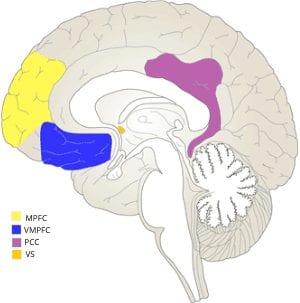#6 Blew Me Away!
“Researchers have long marveled at the almost-magical power of self-affirmation”
(Cascio et al, 2015)
Self-help and spiritual communities have long known what science is just starting to understand: that a positive mindset can dramatically improve your physical and mental health. There are many ways to harness the power of positivity, but affirmations are widely regarded as an easy and effective method to get started.
Affirmations are positive statements used to challenge unhelpful thought patterns. For example, someone who struggles with anxiety might self affirm with a statement like, “I can handle anything that comes my way,” while someone trying to break a bad habit might self affirm by remembering and recommitting to their values. While specific practices can vary, some studies have revealed information that can help anyone aiming to build a better meditation practice.
So without further ado, here are some scientific facts about positive self affirmations:
First revealed by fMRI scans,
We now know what parts of the brain are activated when we self affirm. These areas manage everything from memory to mood regulation and habit forming. When you self affirm, these processes work together to effectively change the way your brain is wired. This diagram is a cross section of the brain with those areas highlighted.

Get Motivated.
The relationship between self affirmation and positive change has been extensively studied. Researchers have discovered that affirmations can help stop dangerous habits like smoking, sedentary behavior, and eating disorders. Subconsciously, affirmations help you feel more open, less defensive, and thus more capable of making positive changes. So next time you’re writing those New Year’s resolutions, throw in a few affirmations as well.

Affirmations are Preventative Medicine
Affirmations are one of nine mechanisms in what’s known as our “psychological immune system.” Originally coined by Harvard psychologist Dan Gilbert, the psychological immune system is a set of adaptations that helps us process and adapt to stress. It kicks in when we feel upset, threatened, or need help to get over a bad mood. Affirmations are an easy way to strengthen your psychological immune system. Think of them as preventative medicine for your mind and spirit.

Conventional Medicine Uses Them
An increasing number of healthcare facilities are adding affirmations to their integrative toolbox due to its potential health benefits. The various studies conducted revealed that patients who used affirmations showed notable improvements, such as reduced cortisol, better pain management, and a lower likelihood of cognitive impairment. Interestingly, a study of breast cancer survivors linked the use of written affirmations to fewer physical symptoms and more peace.

Better work Performance
Ironically, high-stress jobs often require focus and clarity, which is hindered by the very stress they cause. We know chronic stress leads to brain fog and reduced problem-solving abilities. In addition to acting as a buffer against the effects of stress, affirmations work to improve mental dexterity, creativity, insight, and problem-solving under pressure. In other words, affirmations can seriously improve your work and school performance.

Children Benefit Too.
A child’s early years will shape the rest of their lives for better or for worse. For example, early failure in a child’s life can result in self-esteem issues that, according to scientists, are surprisingly difficult to undo. This is especially true for at-risk or minority children who may not have the support or resources to bounce back. Without intervention, this often results in a snowball effect that can last well into adulthood. Remarkably, research has shown affirmations to have an enormous and long-term impact on children, stopping harmful thought patterns and changing the trajectory of their lives.
One study notes:
“Over 2 years [of using affirmations], the grade point average (GPA) of African Americans was, on average, raised by 0.24 grade points. Low-achieving African Americans were particularly benefited. Their GPA improved, on average, 0.41 points, and their rate of remediation or grade repetition was less (5% versus 18%). Additionally, treated students’ self-perceptions showed long-term benefits” (Cohen et al, 2009).

Affirmations work, but watch out for these caveats:
- You Need to Work For It. Affirmations can help you achieve your goals, but it’s not magic. Daily effort is an important part of any life change, so don’t fall into the trap of affirming without action, as this creates a false sense of confidence. A good example would be that time I affirmed instead of studied, and failed. When using affirmations to achieve your goals, remember to use them in addition to other necessary actions.
- Stay Positive! Make a conscious effort to avoid negative words in your affirmations, as this can negatively impact your subconscious. You want to make sure your hard work is helping instead of hindering your growth.
According to Psychology Today, “The subconscious mind…cannot differentiate between negative and positive, or between what is real and imagined. For example, if we want to be successful, we cannot say things like “I don’t want to be a failure.” The subconscious mind will act upon the word “failure,” ignoring the word “don’t,” and actualizing the undesired result.”
In other words try to avoid using negative words or words that give you a negative reaction.
- It Must be voluntary: In one study, researchers found that affirmations weren’t beneficial if the participants felt pressured into them. A genuine interest and willingness to improve is required, so if your loved ones aren’t interested in trying affirmations it’s best not to force it.
Ready to get started with affirmations? Try these tips:
- Be consistent. While some of the studies mentioned in this article see noticeable results after 1 session, it’s best to use the same affirmations for at least 30-60 days. After that, you can reassess and possibly choose new affirmations.
- Daydreaming helps. Studies show visualizing or thinking about the future fulfillment of a goal or dream helps you internalize the affirmations more quickly.
- You have options! There are lots of ways to self affirm; guided videos, journaling or meditating on your positive values, or repeating positive statements about yourself silently, aloud, or in writing.
- Belief and Positivity are important for getting the most from your affirmations. Remember your subconscious mind will absorb what you feed it so eliminate negative words from your affirmations and try to stay open minded.

Ready to dive deeper?
Check out our Youtube Channel for free guided meditation and affirmation videos.
References
- Creswell JD, Dutcher JM, Klein WMP, Harris PR, Levine JM (2013) Self-Affirmation Improves Problem-Solving under Stress. PLoS ONE 8(5): e62593. https://doi.org/10.1371/journal.pone.0062593
- Epton, Tracy & Harris, Peter & Kane, Rachel & Van Koningsbruggen, Guido & Sheeran, Paschal. (2014). The Impact of Self-Affirmation on Health-Behavior Change: A Meta-Analysis. Health psychology : official journal of the Division of Health Psychology, American Psychological Association.
- Cohen GL, Garcia J, Purdie-Vaughns V, Apfel N, Brzustoski P. Recursive processes in self-affirmation: intervening to close the minority achievement gap. Science. 2009 Apr 17;324(5925):400-3. doi: 10.1126/science.1170769. PMID: 19372432.
- Falk EB, O’Donnell MB, Cascio CN, et al. Self-affirmation alters the brain’s response to health messages and subsequent behavior change. Proc Natl Acad Sci U S A. 2015;112(7):1977-1982. doi:10.1073/pnas.1500247112
- Guptha, Leena. “To Affirm or Not Affirm?” Psychology Today, Sussex Publishers, 25 Apr. 2017, www.psychologytoday.com/us/blog/embodied-wellness/201704/affirm-or-not-affirm
- Steele CM. The psychology of self-affirmation: Sustaining the integrity of the self. In Advances in Experimental Social Psychology L. Berkowitz (Ed.), 1988 vol. 21. pp. 261–302 New York: Academic Press
- Taber, J. M., Klein, W. M., Ferrer, R. A., Augustson, E., & Patrick, H. (2016). A Pilot Test of Self-Affirmations to Promote Smoking Cessation in a National Smoking Cessation Text Messaging Program. JMIR mHealth and uHealth, 4(2), e71. https://doi.org/10.2196/mhealth.5635
- Gilliam, W. P., Burns, J. W., Gagnon, C., Stanos, S., Matsuura, J., Beckman, N. (2012). Strategic self-presentation may enhance effects of interdisciplinary chronic pain treatment. Health Psychology. Advance online publication. doi: 10.1037/a0029205




